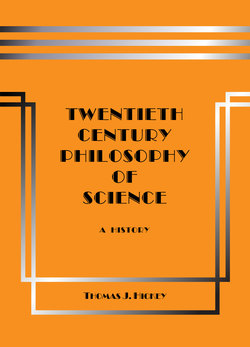Читать книгу Twentieth-Century Philosophy of Science: A History (Third Edition) - Thomas J. Hickey - Страница 82
На сайте Литреса книга снята с продажи.
4.02 Positivist Aim
ОглавлениеThe positivists proposed a foundational agenda based on their naturalistic philosophy of language. Early positivists such as Ernst Mach proposed that science should aim for firm objective foundations by relying exclusively on observation, and should seek empirical generalizations that summarize the individual observations. They initially deemed theories to be at best temporary expedients and too hypothetical to be considered appropriate for science.
After the acceptance of Einstein’s relativity theory by physicists, the later positivists known as “neopositivists” acknowledged the essential rôle that hypothetical theory must have in the aim of science. Between the twentieth-century World Wars, Rudolf Carnap and his fellows in the Vienna Circle group of neopositivists attempted to justify theories in science by logically relating the so-called theoretical terms in the theories to the so-called observation terms that they believed should be the foundational logical-reduction base.
Many of these neopositivists were also called “logical positivists”, because they attempted to use the symbolic logic developed by Bertrand Russell and Alfred N. Whitehead to accomplish the logical reduction of theory language to observation language. The logical positivists fantasized that this Russellian symbolic logic could serve philosophy as mathematics serves physics, and it became their idée fixe. For decades the symbolic logic ostentatiously littered the pages of the Philosophy of Science and British Journal of Philosophy of Science journals with its chicken tracks, and rendered their ostensibly “technical” papers fit for the bottom of a birdcage.
The positivists were self-deluded, because in fact the Russellian truth-functional logic does not adequately capture the hypothetical logic of empirical testing in science. For example the truth-functional truth table says that if the conditional statement’s antecedent statement is false, then the conditional statement is defined as true. But in the practice of science a false antecedent statement means that execution of a test did not comply with the description of initial conditions thus invalidating the test, and is therefore irrelevant to the truth-value of the conditional statement that is the tested theory. Today truth-functional logic is not seriously considered by post-positivist philosophers of science much less by any practicing research scientists.
Consequently the aim of these neopositivist philosophers was not the aim of practicing research scientists. Scientists do not use symbolic logic or seek any logical reduction for so-called theoretical terms. The extinction of positivism was in no small part due to the disconnection between the positivists’ philosophical agenda and the actual practices and values of research scientists.
Readers wishing to know more about positivism are referred to BOOKs II and III below.
